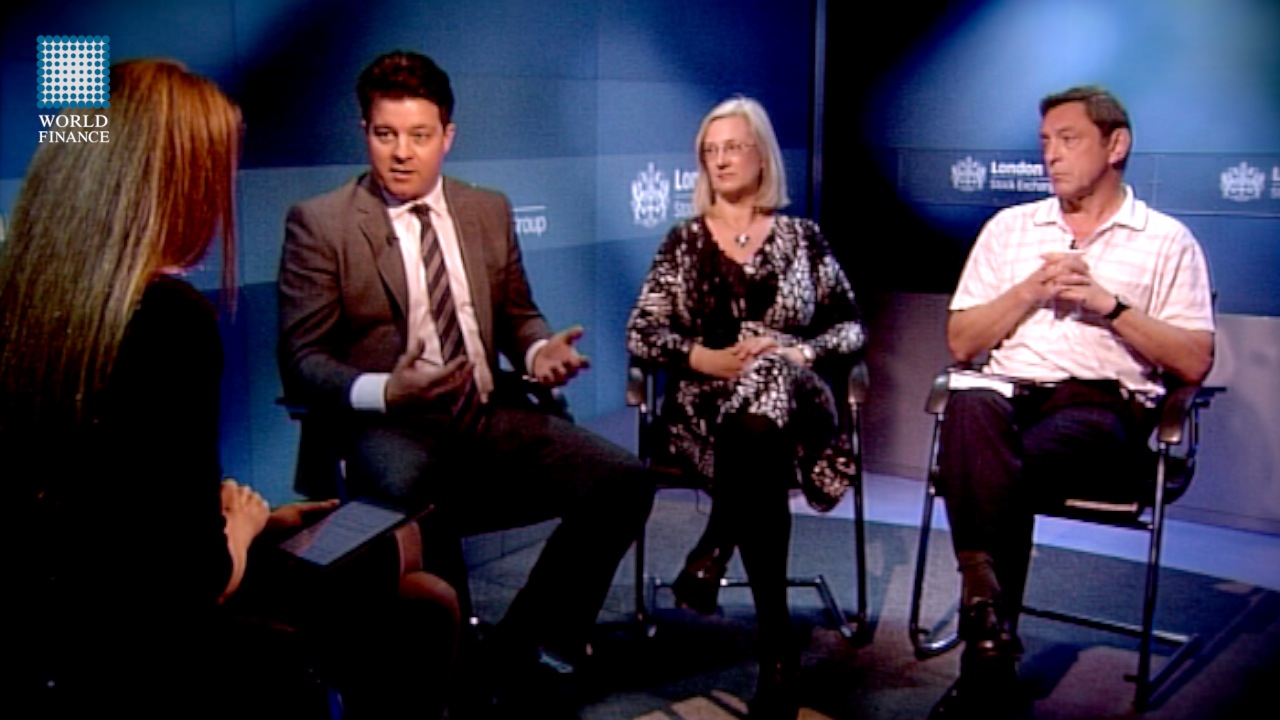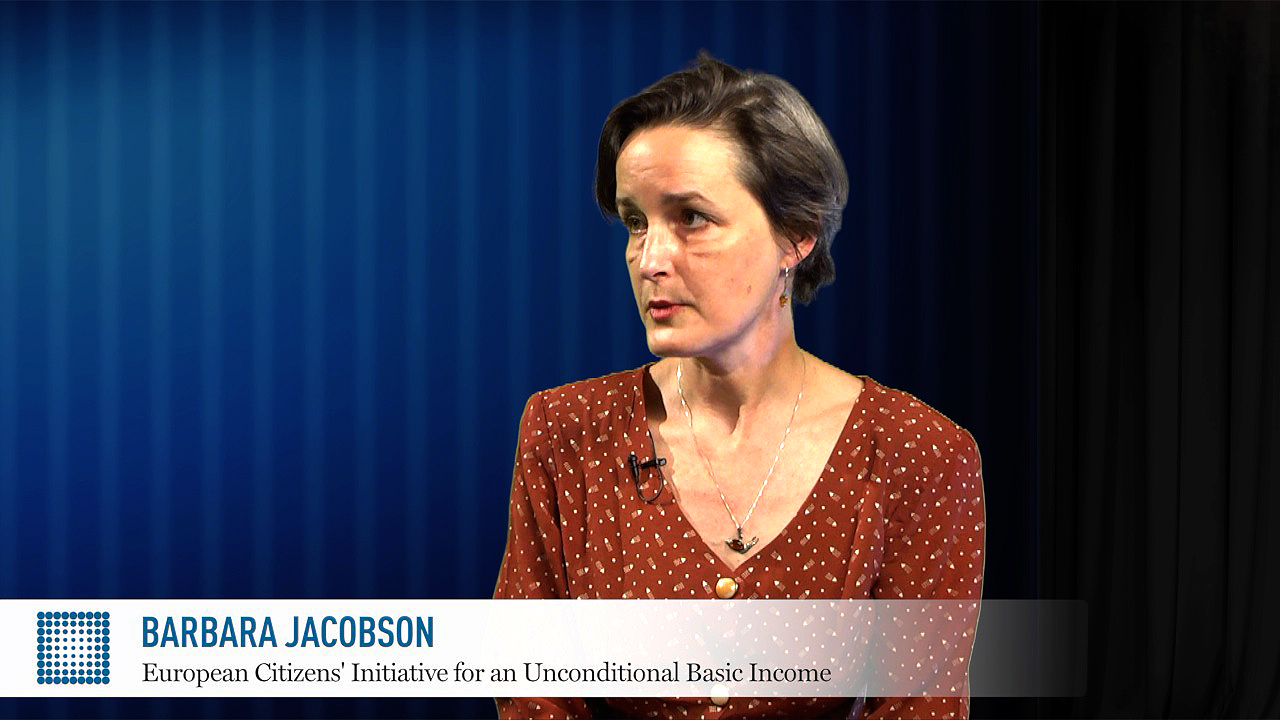Unconditional basic income: Green Party’s Natalie Bennett debates its merits with David Orrell | Video
World Finance invites Green Party leader Natalie Bennett and writer David Orrell to debate the pros and cons of the controversial unconditional basic income
Related:
Transcript
All around Europe, people are fighting for unconditional basic income: a system which many believe will instill equilibrium where there is financial inequality. World Finance invites Green Party Leader Natalie Bennett and writer and mathematician David Orrell to discuss whether unconditional basic income will live up to the revolutionaries’ expectations.
World Finance: Natalie, the Green Party is committed to a basic income, and this has been your policy for quite some time. So getting straight down to business: if implemented, would it save the country money?
Natalie Bennett: What it would ensure is, every person who has the right to remain in Britain would get enough basic subsistence to live on. So what you’re doing is you’re taking away the worry, you’re taking away the insecurity that is an increasing part of people’s lives.
World Finance: Well David, as an economist, do you think that the country could afford this sort of thing?
David Orrell: The versions which are being proposed in the UK are more in the region of around £7,000 per person, and I believe that that could probably be paid for just out of replacing existing benefits – at least mostly.
[Unconditional basic income is] taking away the insecurity that is an increasing part of
people’s lives
World Finance: Natalie, do you agree with David? Is this your concept of basic income, and do you have a figure in mind?
Natalie Bennett: The problem we’ve got in Britain particularly is the issue of housing costs. It’s not possible at those kinds of levels to replace housing benefit at the moment. So you’ve really got to look at citizens’ income as part of a much broader restructuring of the way our economy works.
World Finance: So how do you propose to finance this then?
Natalie Bennett: Two things: there’s the existing benefits like Jobseeker’s Allowance, single parents support, those kinds of benefits. And there’s also the huge costs of administering those things at the moment. You take those costs away – and the Citizens Income Trust has calculated that you could administer basic income at a cost of one percent of the total benefit, which is about the same as child benefit. And you know, that gives you quite a bit of money – not the full sum – but quite a bit of money that you can put into the actual payments to people.
World Finance: Well David, do you think this is reasonable? Or do you think if it was implemented we could expect taxes to rise quite a lot?
David Orrell: I think that’s reasonable, because there are some other factors as well. I mean for example, a problem with our current benefits system is that it first of all stigmatises people for having to collect benefits. But then it also acts as an incentive often to not seek employment, because if you get a job your benefits will be cut. And that wouldn’t be a problem with the basic income scheme, because you’d just get extra money.
World Finance: Natalie, I did hear during an interview that you said ‘unconditional basic income could change people’s behaviour; that a sewer cleaner might be paid more than a banker, and maybe this is fair and reasonable’. I think that was the quote. But this seems like an interesting comparison to me, because one of these jobs is unskilled, the other takes years of study and dedication to achieve. So surely this is quite demotivational really?
Natalie Bennett: Yes, a sewer cleaner – it’s a job that maybe not many people want to do. I would perhaps question whether it’s unskilled, but that’s an extreme example. But if you take what we hear about terrible call centres: the kind of places where they time you when you go to the loo, and you know, every call has to be less than 54 seconds. We’ve all been victims of those kinds of call centres. And if people don’t want to work in those kind of work environments anymore, you very much have to improve the work environment.
World Finance: David, what do you think unconditional basic income would mean for businesses that rely on minimum wage labour?
David Orrell: If jobs are really undesirable, then they would have to pay more. Other jobs, maybe people would be willing to work for less because they would have this basic income, and they could therefore actually charge less, charge a lower wage, potentially.
The biggest trend at the moment is that a large amount of jobs are being automated. Not just in car manufacturing and things like that, but you know, it’s really accelerating a lot now. The price of automation, robots, all this kind of thing is decreasing a lot. So if you look at the trends, there’s going to be less and less of these super low-skilled jobs in the future. And then you have to ask, well, if people aren’t doing that kind of work? I mean first of all how are you going to handle the unemployment? Under our current scheme the unemployment benefits would go through the roof. With something like this I would think the impact would actually be lower.
[Britain’s benefits system] acts as an incentive often to not seek employment, because if you get a job your benefits will be cut
World Finance: Well Natalie, I want to bring you slightly back to minimum wage for a moment here. Do you think if unconditional basic income were implemented, then maybe large corporations might campaign to actually lower minimum wage?
Natalie Bennett: We need to make sure that corporations aren’t freeloading. The problem in Britain is our minimum wage is less than our living wage. You can work for 40 hours a week and not be paid enough money to basically live. And that actually means that things like housing benefit and family tax credit at the moment are actually corporate welfare, which are going straight into the profits of often very large companies that are paying too low a wage.
So what we very much need to do is actually make, now, before we get to a basic income, we need to make minimum wage a living wage. And we need to make sure that people aren’t being exploited under a system with a basic or citizens’ income.
World Finance: Well David, looking at inflation now. If unconditional basic income was introduced, surely the first thing corporations would do is raise prices, making this proposal redundant?
David Orrell: From a certain macro level, by money supply, the money supply won’t be changed by this. Because as I said, it’s being replaced by other things. It’s not printing new money the way something like quantitative easing is. It would increase the velocity of money, if you like: the speed at which money is changing hands. Because there would be more of an impact on people with low incomes, and so that could have a bit of an inflationary impact.
But I would think the effects would be kind of mixed. And as I said, I think it would be relatively small-scale to other things.
Natalie Bennett: But I think David what you’re saying there implies that much else in our economy is going to remain the same. And that’s simply not the case, because one of the other things we’ve got to bring into this is the fact that at the moment in Britain we live what’s known as the ‘Three Planet LIfestyle’; in the US it’s four. And that means that people are actually consuming the equivalent resources of three planets. And one of the things that citizens’ income can do is, because there’s a security net, you don’t have to worry so much. You can actually think about reducing your working hours, consuming less stuff, and get more time in return.
So we have to look at all of this as a package. Not just assuming that things are going to go on as they are now – because they’re not. We’re going to have to see radical changes to fit within the limits of our one planet, and to reshape our society. Because you know, inequality at the moment is at a huge, enormous level, and rising very fast. We’ve gone past Edwardian levels, and we’re heading for Victorian.
World Finance: But do you think basic income could have any dent whatsoever on the wealth gap in real terms?
Natalie Bennett: It’s a foundation, and I think we sort of got away from how we fund it. But you know, I think you do need to ensure that rich individuals and multinational corporations pay much more tax. And that has to happen, you know, anyway. Because we do have to deal with this work inequality, which even organisations like the IMF and the World Bank say are threatening our whole global economy.
World Finance: Well Natalie, my final question for you is: if unconditional basic income, there’s such a strong case for it, then why haven’t the three main political parties got on board with this?
Natalie Bennett: There’s a lot of very good ideas around whether it’s bringing the railways back into public hands, something that has something like 70 percent public support. Keeping the NHS – the National Health Service in Britain – publicly owned and publicly run. There are huge amounts of ideas that have very strong public support and are great ideas. And citizens’ or basic income is one of those. Less well-known among the public certainly, but a great idea.
But we have at the moment in Britain a politics that’s very much stuck in the 20th century. Stuck in the ideas of privatisation, neo-liberalism, globalisation. And we’re headed into a very different world in the 21st century. And I’m afraid at the moment our three largest political parties just haven’t caught up with that.
World Finance: Natalie, David, thank you.
David Orrell: Thank you.
Natalie Bennett: Thank you.

 ‘Wrong-headed economics’: for and against unconditional basic income | Video
‘Wrong-headed economics’: for and against unconditional basic income | Video Unconditional basic income ‘will be liberating for everyone’, says Barbara Jacobson | Video
Unconditional basic income ‘will be liberating for everyone’, says Barbara Jacobson | Video
